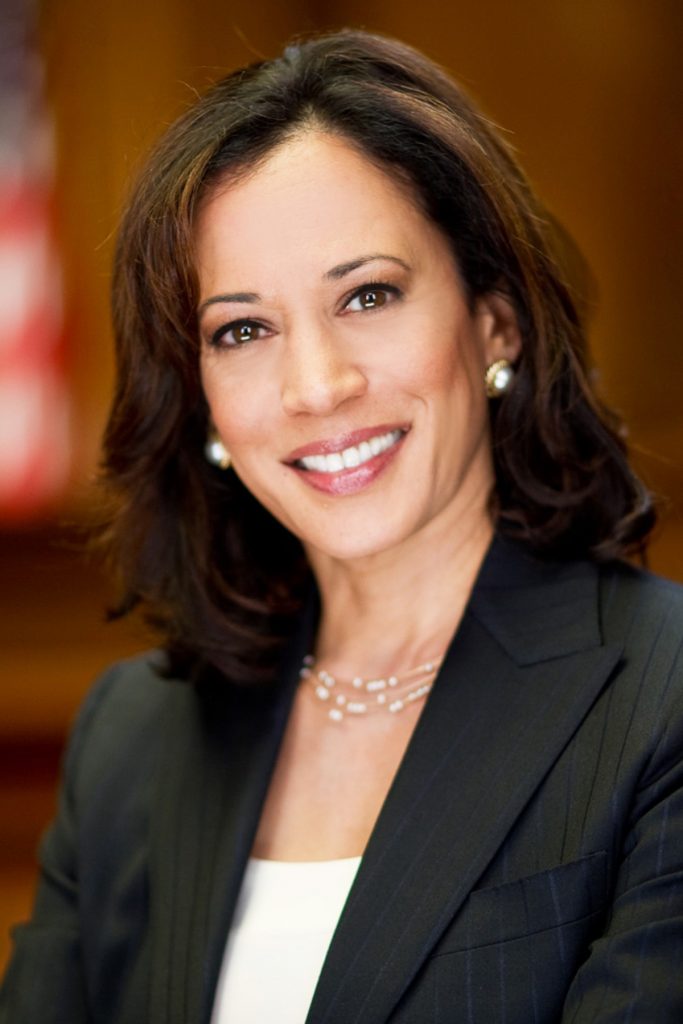By Gregory Lewis McNamee
FEW is celebrating the valiant women throughout history for Women’s History Month. FEW will shine a spotlight on some historic figures of our great nation that fought for justice, equality and inclusion. Visit throughout the month of March to read about “Valiant Women of the Vote: Refusing to be Silenced.” This week we feature Kamala Harris.
Kamala Harris (1964 – )
Kamala Harris is the 49th vice president of the United States in the Democratic administration of Pres. Joe Biden. She was the first woman and the first African American to hold the post. She had previously served in the U.S. Senate (2017–21) and as attorney general of California (2011–17).

Her father, who was Jamaican, taught at Stanford University, and her mother, the daughter of an Indian diplomat, was a cancer researcher. Her younger sister, Maya, later became a public policy advocate. After studying political science and economics (B.A., 1986) at Howard University, Harris earned a law degree (1989) from Hastings College.
She subsequently worked as a deputy district attorney (1990–98) in Oakland, earning a reputation for toughness as she prosecuted cases of gang violence, drug trafficking and sexual abuse. Harris rose through the ranks, becoming district attorney in 2004. In 2010 she was narrowly elected attorney general of California—winning by a margin of less than 1%—thus becoming the first female and the first African American to hold the post. After taking office the following year, she demonstrated political independence, rejecting, for example, pressure from the administration of Pres. Barack Obama for her to settle a nationwide lawsuit against mortgage lenders for unfair practices. Instead, she pressed California’s case and in 2012 won a judgment five times higher than that originally offered. Her refusal to defend Proposition 8 (2008), which banned same-sex marriage in the state, helped lead to it being overturned in 2013. Harris’s book, Smart on Crime (2009; cowritten with Joan O’C. Hamilton), was considered a model for dealing with the problem of criminal recidivism.
In 2012 Harris delivered a memorable address at the Democratic National Convention, raising her national profile. Two years later she married attorney FEW Weekly Web Update March 22, 2021 Douglas Emhoff. Widely considered a rising star within the party, she was recruited to run for the U.S. Senate seat held by Barbara Boxer, who was retiring. In early 2015 Harris declared her candidacy, and on the campaign trail she called for immigration and criminal-justice reforms, increases to the minimum wage and protection of women’s reproductive rights. She easily won the 2016 election.
When she took office in January 2017, Harris became the first Indian American in the Senate and just the second Black woman. She began serving on both the Select Committee on Intelligence and the Judiciary Committee, among other assignments. She became known for her prosecutorial style of questioning witnesses during hearings, which drew criticism—and occasional interruptions—from Republican senators. In June she drew particular attention for her questions to U.S. Attorney General Jeff Sessions, who was testifying before the intelligence committee on alleged Russian interference in the 2016 presidential election; she had earlier called on him to resign. Harris’s memoir, The Truths We Hold: An American Journey, was published in January 2019.
Shortly thereafter Harris announced that she was seeking the Democratic presidential nomination in 2020. From the outset she was seen as one of the leading contenders, and she drew particular attention when, during a primary debate, she had a contentious exchange with fellow candidate Joe Biden over his opposition to school busing in the 1970s and 1980s, among other race-related topics. Although Harris’s support initially increased, by September 2019 her campaign was in serious trouble, and in December she dropped out of the race. She continued to maintain a high profile, notably becoming a leading advocate for social-justice reform following the May 2020 death of George Floyd, an African American who had been in police custody. Her efforts silenced some who had criticized her tenure as attorney general, alleging that she had failed to investigate charges of police misconduct, including questionable shootings. Others, however, felt that her embrace of reform was a political maneuver to capitalize on the increasing public popularity of social change. As racial injustice became a major issue in the United States, many Democrats called on Biden, the party’s presumptive nominee, to select an African American woman—a demographic that was seen as pivotal to his election chances—as his vice-presidential running mate. In August Biden chose Harris, and she thus was the first Black woman to appear on a major party’s national ticket. In November she became the first Black woman to be elected vice president of the United States.
In the ensuing weeks Trump and various other Republicans challenged the election results, claiming voter fraud. Although a number of lawsuits were filed, no evidence was provided to support the allegations, and the vast majority of the cases FEW Weekly Web Update March 22, 2021 were dismissed. During this time Harris and Biden began the transition to a new administration, announcing an agenda and selecting staff. By early December all states had certified the election results, and the process then moved to Congress for final certification. Amid Trump’s repeated calls for Republicans to overturn the election, a group of congressional members, which notably included Senators Josh Hawley (Missouri) and Ted Cruz (Texas), announced that they would challenge the electors of various states. Shortly after the proceedings began on Jan. 6, 2021, a mob of Trump supporters stormed the Capitol. It took several hours to secure the building, but Biden and Harris were eventually certified as the winners. She later denounced the siege—which many believed was incited by Trump—as “an assault on America’s democracy.” On January 18 she officially resigned from the Senate. Two days later, amid an incredible security presence, Harris was sworn in as vice president.
About the Author: By Gregory Lewis McNamee, contributing editor, Encyclopedia Britannica; literary critic, Hollywood Reporter. Author of Moveable Feasts: The History, Science, and Lore of Food and more.


